#attachment theory
Explore tagged Tumblr posts
Text
Damian Desmond: An Attachment Perspective
**Spoilers for SxF Chapter 106 Below**
I loved this chapter for so many reasons, but the one I really want to highlight today is that Damian may be insecurely attached, but he still has hope. And that he is so brave, in his own way.
Exhibit A: When Damian knocks on Demetrius' door and asks for help, I am 100% positive that Damian wasn't truly expecting a response from Demetrius. He's used to being ignored, especially by his own family.
But he tried anyway.

This is important, because most children of Damian's age who fall under the category of avoidant attachment wouldn't approach a situation like this where there is a possibility that they would be rejected. It speaks volumes to me that Damian has a sense that he would be turned away, but still he tries.
"I was hoping..."
Exhibit B: There is also this moment where we see that Damian wanted to say something, and then he silences himself before he can say anything.
(Don't cry, Lass, omg dont cry 😭😭😭 )
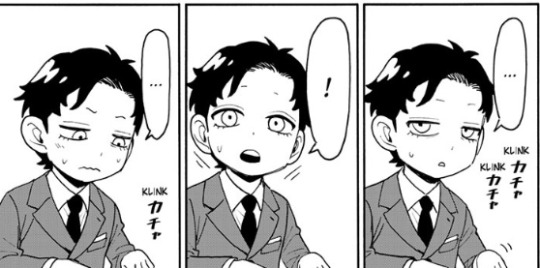
Damian is initially afraid, so he silences himself, but then there is this moment, where he pulls himself together, and tries again.
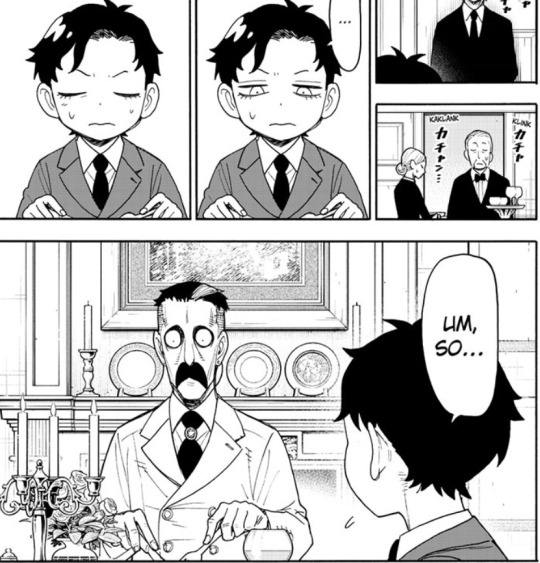
Endo is so brilliant at drawing out moments of important decisions for characters. You can see Damian making the decision to say something, and gather his courage, but he only falls short once he actually succeeds at getting Donovan's attention.
Under the heavy gaze of the head of the Desmond dynasty, I'm not surprised that 6-year old Damian felt his resolve crumble.
But!
He reverts to another option: find support. Which leads me to...
Exhibit C: This one makes me sob, actually. In response to his wavering confidence, Damian looks to his mother for support. The woman who should be his primary caregiver, and therefore his primary attachment figure.

And she turns away.
(Tears, tears down my face, my boy doesn't deserve this 😭 )
This is the third moment in this chapter alone that Damian does something that no other Desmond would dare: he seeks connection.
Damian tried to connect with his brother, his father, and his mother, all in the same chapter. He is the sole character that links them all.
All through Chapter 106, these are the moments that stood out to me the most, because it truly shows to me that Damian still has hope. Demetrius and Melinda are very clearly ingrained in their roles, and their behaviour is crystallised into what we see as the reader. It's obvious that this isn't the first time that Demetrius has rebuffed Damian's requests; and this isn't the first time that Melinda has ignored Damian's emotional needs.
I hear you wondering: Does Damian still have hope because he's still just a child?
Maybe. It's certainly possible. But I also want to highlight that Damian is insecurely attached; specifically showing an insecure-avoidant attachment style.
Children with this style of attachment typically experience high levels of emotional neglect, where their primary caregiver consistently does not meet their emotional needs. This leads the child to value independence, autonomy, and self-reliance, and to generally see others as untrustworthy.
We see this in Damian. He believes he is better, usually weaponising the Desmond name to place himself above others, but there is also an element where he believes he is better, because he ranks highly in the social hierarchy, and he achieves brilliant grades on his own merit, demonstrating his own self-reliance.
(Side note: Issues stemming from an avoidant attachment style can still coexist with self-esteem issues, but I'm trying not to complicate this post lol).
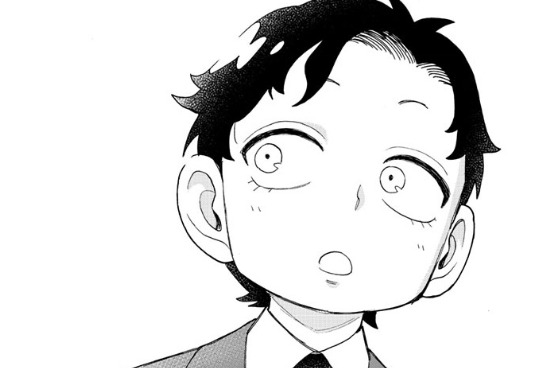
My point: Damian has experienced enough rejection in his childhood that he shouldn't even be trying with his own family anymore. But he does. He keeps trying. Damian still hopes that he can connect with his family, and I think that this is because this is a part of his actual personality.
On the inside, Damian is complex; he struggles with the weight of his identity, he is trying to find his place in the world, he yearns for attention and validation (specifically from his father), he finds comfort in believing that he is better than other people (even his friends), he struggles to handle big emotions, he prefers to work things through independently, and struggles to be vulnerable and ask for help, and he lies to himself about his big feelings so that he can avoid feeling them.
And my favourite thing about him: he still keeps trying. He gathers his courage. He gets back up. Time and time again he feels afraid, and time and time again he feels the fear and he tries anyway.
Damian is so brave, in his own way.
#help i've dissolved into tears#i love my baby boy so much#he really doesn't deserve this#he deserves so much joy#please can someone hug this child#damian desmond#spy x family analysis#spy x family#sxf#spy x family manga#spy x family spoilers#avoidant attachment#attachment theory#attachment
227 notes
·
View notes
Note
avoidant culture is feeling far more comfortable yearning for fictional people that don't exist because i never actually have to get close to them. i can just write alone and feel comfortable never divulging anything
.
#avoidant attachment culture#dismissive avoidant attachment#fearful avoidant attachment#avoidant attachment#avoidant#fearful avoidant culture#fearful avoidant#disorganized attachment#attachment theory#attachment style#bpd#npd#aspd#avpd#hpd#dpd#stpd#szpd#ppd#ocpd#avoidant attachment culture is#dismissive avoidant#avoidant culture is#dismissive avoidant culture is#avoidant attachment style#personality disorders#pds#mental health#culture#culture is
67 notes
·
View notes
Text







bessel van der kolk on disorganised attachment
92 notes
·
View notes
Text

lol .
#attachment issues#bpd yandere#bpd core#irl yandere#love#obsessed#obsessive yandere#yanderecore#obsession#yandere#anxious attachment#delusional attachment#avoidant attachment#disorganized attachment#bpd attachment#attachment styles#attachment theory#bpd fp#actually bpd#bpd vent#bpd feels#bpd thoughts#bpd blog#personality disorder#bpd problems#bpd stuff#bpd#bpd safe#narcissistic personality disorder#borderline personality disorder
63 notes
·
View notes
Text
Unresolved abandonment is the root of self-sabotage.
Susan Anderson, The Journey From Abandonment to Healing
#Susan Anderson#quotes#The Journey from Abandonment to Healing#abandonment#abandonment wound#attachment theory#attachment styles#anxious attachment#psychotherapy#psychology#self help#mental health#fearful avoidant#dismissive avoidant#heal#self healing#self sabotage#self esteem#personal growth#personal development#breakup recovery#breakup
974 notes
·
View notes
Text
Anxious attachment culture blog
This is for those with an anxious attachment style to vent, talk about experiences or send in characters that you relate to.
> Also see @avoidant-attachment-culture
Rules
- Open with "anxious attachment culture is.." for each ask.
- Do not demean other attachment styles by making negative blanket statements about their nature e.g. "avoidant attachers are always x".
- You may submit asks if you only have anxious tendencies or swing between attachment styles (this includes fearful avoidant/disorganized) as long as it relates to the experience of being anxious.
- You may use sign offs, they will be tagged for filing.
This is run by >> @evilsystemm and @galaxysystemm <<
Similar blogs
@narcissisticpdcultureis
@schizotypalpd-culture-is
@aspdculture-is
@hpdcultureis
@narccultureis
@borderline-culture-is
@cluster-b-culture
@cluster-b-culture-is
@aro-culture-is
@ace-culture-is
@bi-culture-is
@avpdcultureis
@ndcultureis
@ocpd-culture-is-blog
@dpd-culture-is-blog
@schizotypal-culture-is
@schizoid-culture-is
@paranoia-culture-is
@ppd-culture-is
#anxious attachment#anxious attachment style#anxious attacher#fearful avoidant#dismissive avoidant#attachment styles#attachment style#anxious culture is#anxious attachment culture is#attachment theory#avoidant attachment#disorganized attachment#attachment issues#anxious preoccupied#culture blog#culture is#bpd#npd#aspd#hpd#avpd#ppd#stpd#szpd#dpd#ocpd#actually narcissistic#npd culture is#actually npd#audhd
34 notes
·
View notes
Text
there are two wolves inside me (i have disorganized attachment)
116 notes
·
View notes
Text
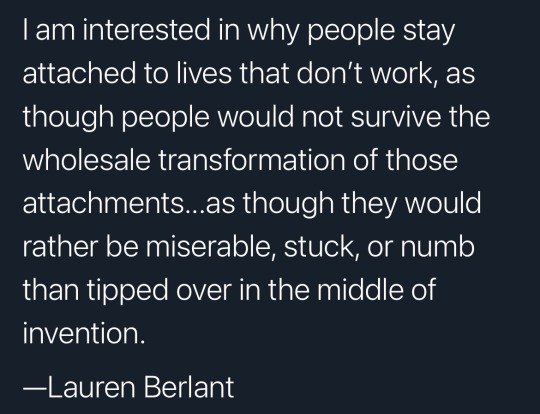
this is soooo loa-ditch-the-old-self-coded. i fucking love the phrase “tipped over in the middle of invention.” be brave enough to persist in your invention.
#loassumption#law of assumption#loa#loa tumblr#loa blog#quotes#writing#self belief#self love#reinvent yourself#reinvention#attachment theory#attachment styles#manifestation#law of manifestation#manifesting#desire#fulfillment#change yourself#change your life#live in the end#wish fulfilled#it is done#quantum leap#self concept#neville goddard#edward art#mindset#imagination#states of consciousness
135 notes
·
View notes
Text
now that people are starting to recognize love languages as heteronormative nonsense, can we just talk about the pop psychology application of attachment theory for a second?
I know I'm not the only one who has noticed the fixation on Anxious vs. Avoidant Attachment. But is it me or does this false dichotomy sound suspiciously like a proxy for gender essentialism??
#attachment theory#anxious attachment#avoidant attachment#insecure attachment#gender essentialism#heteronormativity#gender roles#pop psychology#love languages
60 notes
·
View notes
Text
'' It’s not about changing who you are; it’s about embracing who you are while creating space for connection ''.
1. Dismissive-Avoidant
"It’s okay to lean in—strength is not about never needing anyone; it’s about knowing when to let others in."
"Your independence is your superpower, but connection is what makes it meaningful. Balance is where growth happens."
2. Fearful-Avoidant (Disorganized Attachment)
"Your past does not define your capacity for love or trust. Healing happens one safe step at a time."
"You can hold fear and love at the same time—it's brave to try, even if it feels uncertain."
3. Avoidant-Restrictive
"It’s okay to let yourself be seen. Vulnerability isn’t weakness; it’s a doorway to deeper connection."
"You deserve a love that feels free and expansive, not confining or overwhelming."
4. Anxious-Avoidant
"You don’t have to choose between safety and closeness—healthy love offers both."
"You’re allowed to take things slow. Trust is built one moment, one step at a time." ________________ A Helpful Workbook on amazon to Work on Yourself :
The Fearful Avoidant Attachment
#healthy relationship#toxic relationship#relationships#relationship advice#personal improvement#personal development#emotional attachment#attachment issues#anxious attachment#avoidant attachment#attachment styles#glow up tips#level up journey#personal growth#self development#self improvement#self help#mental health#self love#disorganized attachment#teacher attachment#disorganized attachment style#fearful avoidant#fearful avoidant attachment#fearful avoidant attachment style#attachment theory#long distance relationship#long distance relationships#ldr#ldr love
51 notes
·
View notes
Text
Utsukushii Kare master post
With Utsukushii Kare: Eternal becoming available on streaming in Japan and rumors of international streaming distribution on the horizon, I thought this might be a good time to do a roundup post of all of my meta writing on the series so far. There's quite a bit of it. Between the complexity of the psychological themes in this series and my capacity for hyperfocus, I ended up with a lot to say.
In case it doesn't go without saying, this post is subject to change as I continue to post on this topic.
The psychological paradoxes of Utsukushii Kare
This is a series of posts (the current plan is to write three installments) about what it says on the tin: paradoxical psychological dynamics in Utsukushii Kare. These are things about the characters that may seem contradictory at first but can be accounted for by digging deeper into some psychological concepts. These posts are focused on the series (both seasons) but will draw from the movie and from the novel and related stories when they illustrate points about the series.
Part 1: Covert grandiosity and finding status through idealization - A pretty deep dive into 1) the subtle ways Hira shows that while his self-image can be highly negative in some ways, in other respects he feels superior to others and 2) how by elevating Kiyoi’s status and humbling himself in comparison, Hira attains a different kind of status.
An addendum of sorts to part 1: Hira's parents and his self-defeating tendencies - Some guesswork about how Hira's parents could have contributed to his self-defeating personality, with some further discussion of specific self-defeating strategies he uses in his relationship with Kiyoi and elsewhere.
Utsukushii Kare through the lens of pursuer-distancer dynamics and related psychological concepts:
The pursuer-distancer dyad & how it applies to the world of BL - a primer on this psychological concept and how it applies to BL generally, with a brief reference to how this concept applies to Utsukare (also touches on Semantic Error and talks in detail about an example from To My Star 2). This one isn't super focused on Utsukushii Kare but is pretty de rigeur for understanding my UK posts on this topic.
Paradoxical roles; or, I think I finally figured out the pursuer-distancer dynamic in Utsukushii Kare - This post comes after some of the posts listed below but I recommend reading it first as this is really where (I think) I cracked the code on this aspect of the story.
Pursuer-distancer roles & attachment style in Utsukushii Kare, Part 1: Hira - In-depth discussion of Hira's role in the pursuer-distancer dyad, his attachment style, and his personality
Pursuer-distancer roles and attachment style in Utsukushii Kare Part 2: Kiyoi - In-depth discussion of Kiyoi's role in the pursuer-distancer dyad, his attachment style, and his personality
Re-evaluating pursuing & distancing in Utsukushii Kare season 1 - super detailed post working out my thoughts about pursuing and distancing in season 1
On the way Sakai Mai (the series' director) uses seme left, uke right framing and its significance in BL and other Japanese media:
Using an example from the s2e1 with the girl who hits on Hira at a party (via a reblog of a gifset from @nanons)
On the way Sakai flips Hira's and Kiyoi's position in the frame in two versions of the same scene and what it tells us about its significance
How the persistent/cute trope plays out in Utsukushii Kare season 2, plus related overanalyses of the big season 2 finale kiss:
The persistent and the cute (how "persistent" and "cute" are code words with specific meanings in BL/yaoi/other drama and manga genres/Japanese culture more broadly)
Analyzing the season 2 finale kiss in light of seme left/uke right framing and the persistent/cute trope (in a reblog of a gif post by @nanons)
Reblogging @bl-bracket to lobby for the season 2 finale kiss, with more overanalysis
Fragrance nerd discussion:
This bittersweet fragrance - on the significance of osmanthus/tea olive in Utsukushii Kare season 2, with additional information on the possible significance of the fragrance of osmanthus and perfumes that are either osmanthus soliflores or feature prominent osmanthus notes
Posts on specific season 2 episodes:
initial thoughts about S2e1
Additional (informal) thoughts on s2e1
S2e1 rundown
Hira's incongruous/misaligned affect at the end of s2e1
S2e2 rundown
on S2e2, including pursuer-distancer dynamics and seme left, uke right
Utsukushii Kare S2E4: “face me straight on” (mostly discussing relationship dynamics pointed out in topic-specific metas)
on Utsukushii Kare: Eternal:
Kiyoi and Anna: on Kiyoi’s friendship with Anna and its significance for his personal growth
#utsukushii kare#utsukushii kare meta#utsukushii kare analysis#utsukushii kare season 1#utsukushii kare season 2#utsukushii kare 2#utsukushii kare eternal#utsukushii kare: eternal#hira x kiyoi#japanese bl#jbl#my beautiful man#psychology of bl#pursuer distancer dynamic#attachment theory#attachment style
224 notes
·
View notes
Text
Growing up Evangelical Fundamentalist Christian I was taught that being a mother was the highest calling a woman had.
I was a severely parentified. My mom ran whole ass illegal daycare she referred to as "Godcare". We'd get locked in the backyard, and I was held responsible if anything happened.
So I read parenting books, and books on education, and child development.
I would continue on to read books about anthropology, biology, psychology, and neuroscience.
I was taught being a mother was my highest calling, and I agree that being a primary attachment figure is the most important responsibility in the world because early childhood development is that important.
#ex fundamentalist#ex christian#dysfunctional parents#religious trauma#ex fundie#ex religious#ex evangelical#parenting#early childhood education#early childhood development#serve and return#attachment parenting#attachment theory
16 notes
·
View notes
Text
For all of its pain and intensity, abandonment serves as a catalyst for profound personal growth.
Susan Anderson, The Journey from Abandonment to Healing
#Susan Anderson#The Journey from Abandonment to Healing#quotes#heal#abandonment wound#abandonment#personal growth#personal development#psychotherapy#psychology#attachment styles#attachment theory#anxious attachment#fearful avoidant#dismissive avoidant#self worth#self help#self esteem#mental health#breakup recovery#breakup
213 notes
·
View notes
Text
Anxious attachment styles are typically anxious to receive the love that they never received in childhood (even if it’s in unhealthy ways)
Avoidant attachment styles are typically afraid of love because love normally meant harm when they were a child (so they push away people they probably shouldn’t)
And disorganized people are typically afraid of love but are also anxious to receive the love they never received in childhood (so they either look for it in unhealthy ways or relationships become complicated due to the fear)
#attachment styles#attachment theory#anxious attachment#avoidant attachment#disorganized attachment#relationships#anxious attachment style#avoidant attachment style#disorganized attachment style#I don’t know why I posted this now#just relflecting I guess
79 notes
·
View notes
Note
anxious attachment style is. its hard to not be anxious when people keep fucking proving me wrong and slowly distancing themselves and talking to me less before they fucking leave
.
#anxious attachment#anxious attachment culture is#anxious attachment style#attachment styles#anxious attacher#anxious attachment culture#anxious culture is#anxious preoccupied#attachment theory#disorganized attachment
9 notes
·
View notes
Text
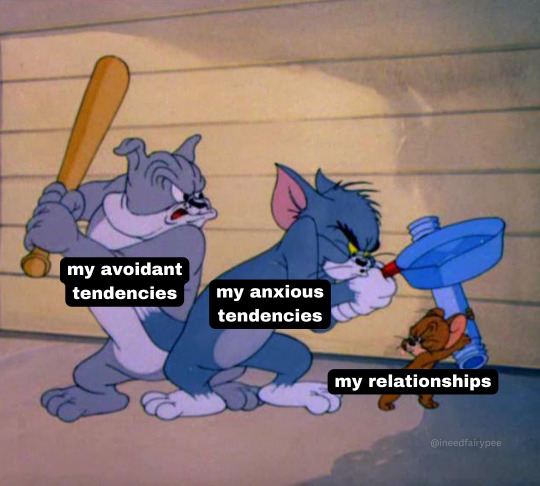
When the intrapersonal conflict leads to interpersonal conflict 🔥
#tom and jerry#tom and jerry memes#tom and jerry edit#anxious attachment#avoidant attachment#attachment#attachment styles#attachment issues#attachment theory#relationships#relationship memes#relationship issues#psychology#psychology memes#psych memes#psychology student#psych student#oc memes#oc meme#memes#self sabotage#tw self destruction#tom and jerry meme#ineedfairypee#fairypeememes#I Need Fairy Pee#interpersonal conflict#intrapersonal conflict
46 notes
·
View notes